My Early 20's Was Really Me Like "I WISH I Had The Time To Eat Healthy, Sleep, And Work Out But I Just
My early 20's was really me like "I WISH I had the time to eat healthy, sleep, and work out but I just have too many other important things in my life right now" meanwhile I was emotionally absent, disassociating from stress and lack of sleep and nutrition, and totally abandoning myself for an idealized version of me I thought I could become simply by force and willpower
Insane to reflect on like....if you don't take care of yourself you actually CANT show up for anything you love or want
Why doesn't anyone teach us that
More Posts from Greenmead-w and Others
。゚゚・。・゚゚。 ゚. September will bring blessings.
゚・。・゚
Being a young adult is so strange. You enter a coffee shop. The 20 year old girl waiting behind you cried all night because she just came to a new city for university and she feels so alone. That 27 year old guy over there works a job he is overqualified for, he lives with his parents and wants to move out but doesn't know what to do about it. That one 24 year old dude already has a car, a house, and a job waiting for him once he graduates thanks to his dad's connections. The 26 year old barista couldn't complete his higher education because he has to work and take care of his family. The 28 year old girl sitting next to you has no friends to go out with so she is texting her mother. That couple (both 25 years old) are married and the girl is pregnant. The 29 year old writing something on her laptop has realized that she chose the wrong major so she is trying to start all over. We are not alone in this, but we are actually so alone. Do you feel me
yes, doctors suck, but also "the medical ethics and patient interaction training doctors receive reinforces ableism" and "the hyper competitive medical school application process roots out the poor, the disabled, and those who would diversify the field" and "anti-establishment sentiment gets applications rejected and promotions requests denied, weeding out the doctors on our side" and "the gruesome nature of the job and the complete lack of mental health support for medical practitioners breeds apathy towards patients" and "insurance companies often define treatment solely on a cost-analysis basis" and "doctors take on such overwhelming student loan debt they have no choice but to pursue high paying jobs at the expense of their morals" are all also true
none of this absolves doctors of the truly horrendous things they say and do to patients, but it's important to acknowledge that rather than every doctor being coincidentally a bad person, there is something specific about this field and career path that gives rise to such high prevalence of ableist attitudes
and I WILL elaborate happily
A lot of sentiments I see online about "just standing up for yourself" fall apart when considering that a common consequence of "standing up for yourself" is losing a key part of your current support network. It's hard to tell someone to stop being transphobic to you when you carpool with them to work, and it'll get a lot more expensive without them. Can your budget tolerate that cost, or is it the expense that stretches you too far? It's hard to tell someone that they need to be more polite to you when they're the one who helps walk you through legalese. Can you find someone else to do it for you, or are you left floundering? It's hard to tell someone to stop being sexist to you when they're the one writing your reference letter. Do you have someone else who can be your reference, or are they the only one whose letter would be accepted?
In order to be able to stand up for yourself, you need to be able to bear the potential consequence of that person leaving. You need to either have redundancy in your network, or be able to pay for what they did for you. Safety is about more than if someone will hit you.

heart - shaped scallion found In pho . reblog for good luck & yummy soup 500000 forwver


Disgusting. The more you learn, the worse it gets
Need a reliable environment for book recs cause I’m close to giving up after reading the cruel prince
i no longer respect the hustle i want universal basic income and dignity for everyone

x
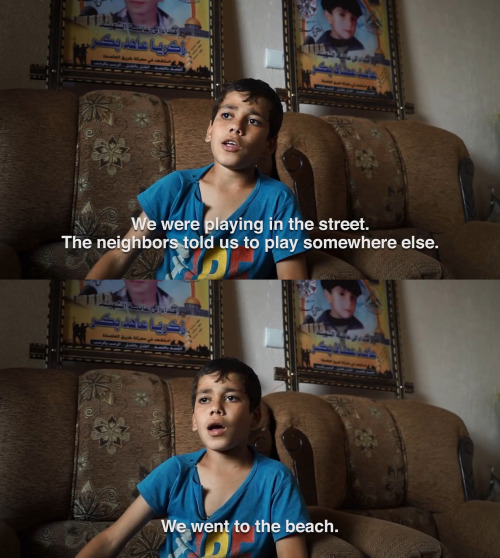
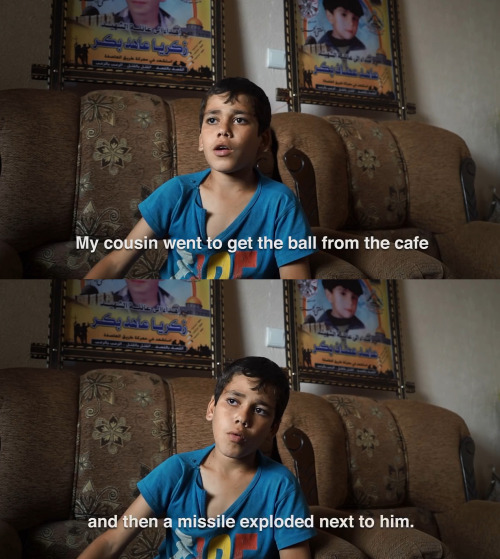
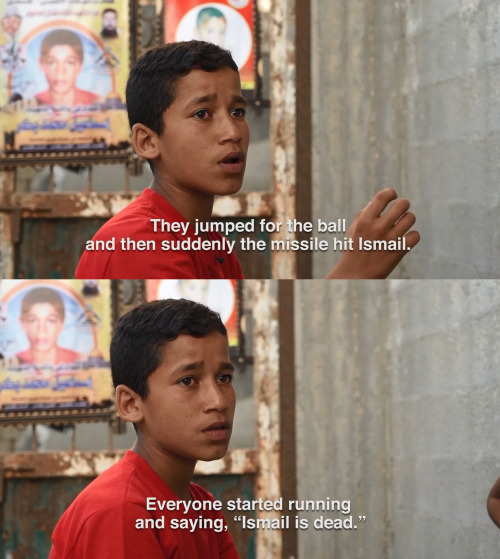
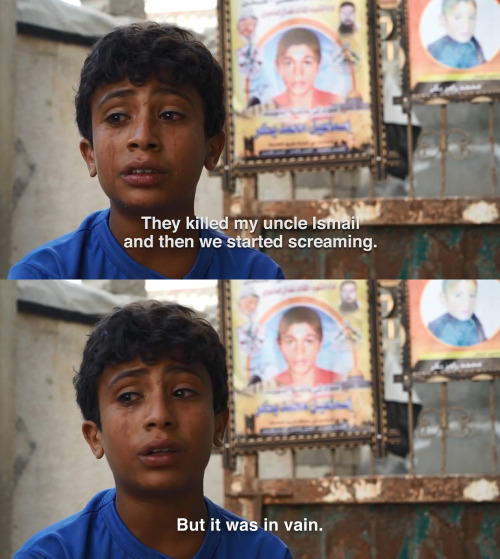

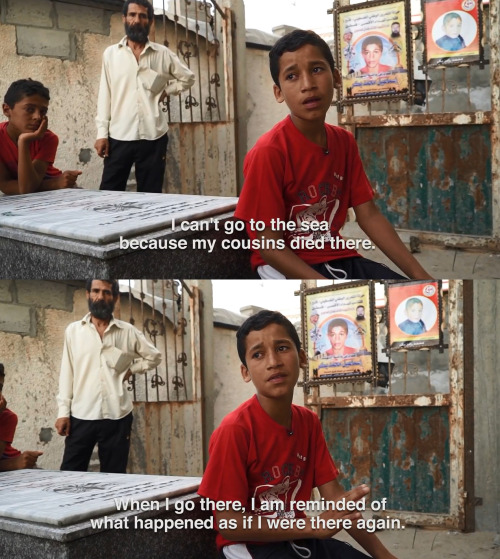
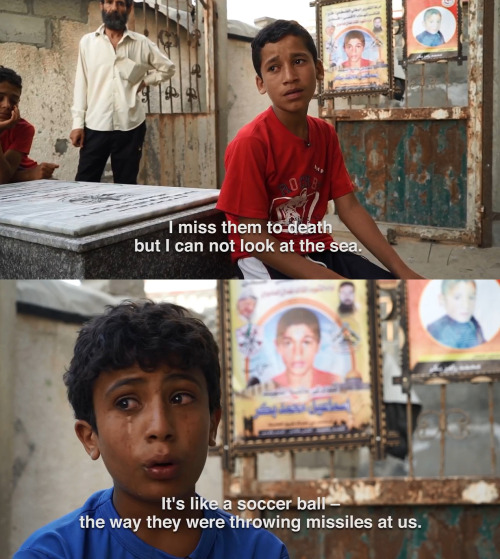
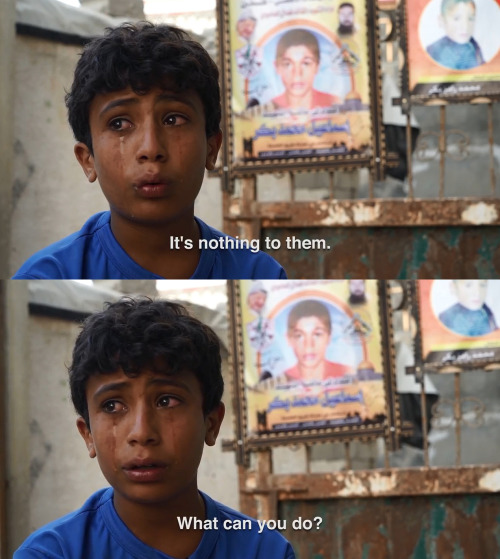
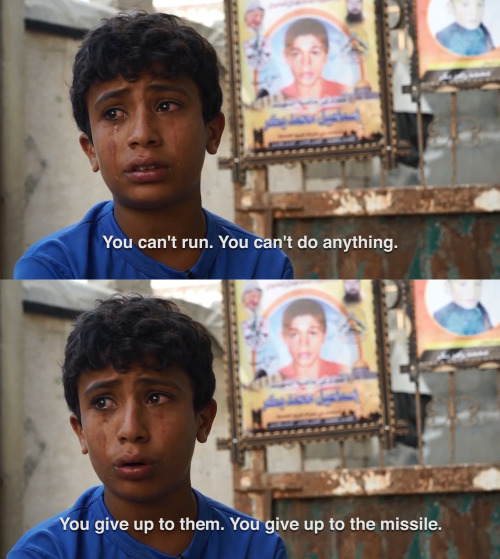
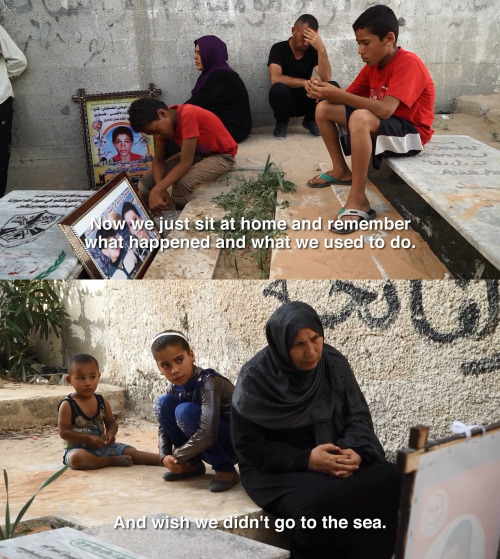
VIDEO: Living Under Israel’s Missiles
Four boys of the Bakr family were killed by a missile strike during last year’s incursion. Their surviving family members are still scarred from the attack.
More than anyone, children bear the brunt of regular Israeli military assaults on the Gaza Strip. During the 51-day war in the summer of 2014, 551 children were killed and 3,436 were injured. But these gruesome figures say little about the psychological state of the nearly 800,000 children who have survived the periodic bombing campaigns. After the final cease-fire that ended Israel’s Operation Protective Edge on August 26 of last year, UNICEF estimated that at least 425,000 Palestinian children in the besieged Gaza Strip require “immediate psychosocial and child protection support.”
[ The physical wounds of Gaza children might have healed, but they live with enduring psychological trauma ]
-
 still-nobody reblogged this · 3 weeks ago
still-nobody reblogged this · 3 weeks ago -
 arborium reblogged this · 3 weeks ago
arborium reblogged this · 3 weeks ago -
 vaes liked this · 1 month ago
vaes liked this · 1 month ago -
 daenaerystargaryen reblogged this · 1 month ago
daenaerystargaryen reblogged this · 1 month ago -
 greenfloralmayy reblogged this · 1 month ago
greenfloralmayy reblogged this · 1 month ago -
 aalgophobias reblogged this · 2 months ago
aalgophobias reblogged this · 2 months ago -
 azxesa reblogged this · 3 months ago
azxesa reblogged this · 3 months ago -
 azxesa liked this · 3 months ago
azxesa liked this · 3 months ago -
 pulpfixti0n reblogged this · 4 months ago
pulpfixti0n reblogged this · 4 months ago -
 soy-girl-almighty liked this · 4 months ago
soy-girl-almighty liked this · 4 months ago -
 ellanen liked this · 4 months ago
ellanen liked this · 4 months ago -
 in-dee-vidual reblogged this · 4 months ago
in-dee-vidual reblogged this · 4 months ago -
 lowflying-angel reblogged this · 5 months ago
lowflying-angel reblogged this · 5 months ago -
 out-of-orbit liked this · 5 months ago
out-of-orbit liked this · 5 months ago -
 annammwml liked this · 6 months ago
annammwml liked this · 6 months ago -
 femboyshooter reblogged this · 6 months ago
femboyshooter reblogged this · 6 months ago -
 artimies6 reblogged this · 6 months ago
artimies6 reblogged this · 6 months ago -
 lupercaz reblogged this · 6 months ago
lupercaz reblogged this · 6 months ago -
 hobbitsetal liked this · 6 months ago
hobbitsetal liked this · 6 months ago -
 artimies6 reblogged this · 6 months ago
artimies6 reblogged this · 6 months ago -
 sirkolbe liked this · 6 months ago
sirkolbe liked this · 6 months ago -
 dicean0therdice liked this · 7 months ago
dicean0therdice liked this · 7 months ago -
 stealingmyplaceinthesun reblogged this · 7 months ago
stealingmyplaceinthesun reblogged this · 7 months ago -
 vermilionvexation liked this · 7 months ago
vermilionvexation liked this · 7 months ago -
 papergyroscope liked this · 7 months ago
papergyroscope liked this · 7 months ago -
 accogliere liked this · 7 months ago
accogliere liked this · 7 months ago -
 saffronbaklava liked this · 7 months ago
saffronbaklava liked this · 7 months ago -
 girlgen1us liked this · 7 months ago
girlgen1us liked this · 7 months ago -
 fade-out-lights liked this · 7 months ago
fade-out-lights liked this · 7 months ago -
 joanbaezunderstander liked this · 7 months ago
joanbaezunderstander liked this · 7 months ago -
 fantasmagorico reblogged this · 7 months ago
fantasmagorico reblogged this · 7 months ago -
 candlesoul reblogged this · 7 months ago
candlesoul reblogged this · 7 months ago -
 candlesoul liked this · 7 months ago
candlesoul liked this · 7 months ago -
 personshapedsplder liked this · 7 months ago
personshapedsplder liked this · 7 months ago -
 alihedgie reblogged this · 7 months ago
alihedgie reblogged this · 7 months ago -
 alihedgie liked this · 7 months ago
alihedgie liked this · 7 months ago -
 lbcrow liked this · 7 months ago
lbcrow liked this · 7 months ago -
 rathayibacter liked this · 7 months ago
rathayibacter liked this · 7 months ago -
 catalyticgenesis reblogged this · 7 months ago
catalyticgenesis reblogged this · 7 months ago -
 catalyticgenesis liked this · 7 months ago
catalyticgenesis liked this · 7 months ago -
 antsfestival liked this · 7 months ago
antsfestival liked this · 7 months ago -
 apprenticegamemaster reblogged this · 7 months ago
apprenticegamemaster reblogged this · 7 months ago -
 apprenticegamemaster liked this · 7 months ago
apprenticegamemaster liked this · 7 months ago -
 aroacenezhaanddainsleif liked this · 7 months ago
aroacenezhaanddainsleif liked this · 7 months ago -
 redfirefox-55 reblogged this · 7 months ago
redfirefox-55 reblogged this · 7 months ago -
 redfirefox-55 liked this · 7 months ago
redfirefox-55 liked this · 7 months ago -
 healingaspie reblogged this · 7 months ago
healingaspie reblogged this · 7 months ago -
 heiressofnerdiness liked this · 7 months ago
heiressofnerdiness liked this · 7 months ago -
 mg-dl liked this · 7 months ago
mg-dl liked this · 7 months ago -
 empire-of-the-words reblogged this · 7 months ago
empire-of-the-words reblogged this · 7 months ago
